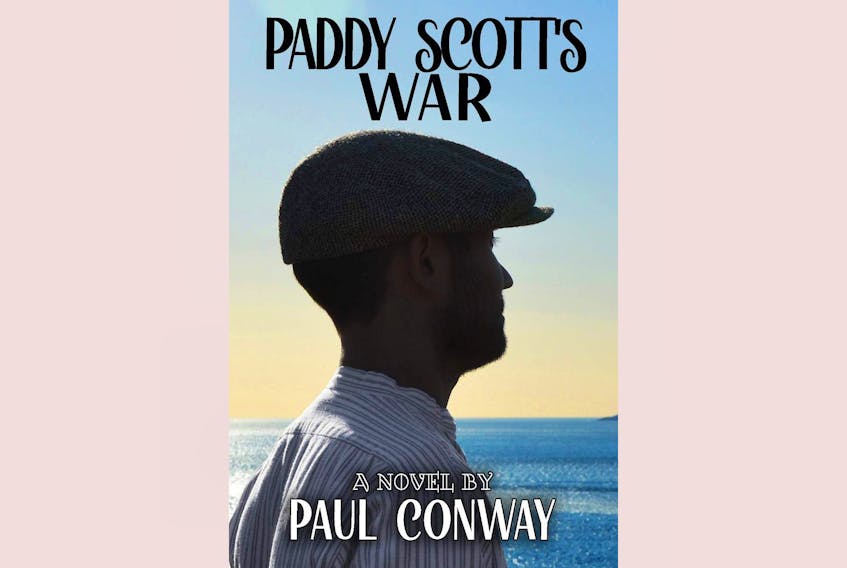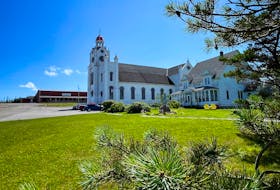During a trip through France and Belgium to visit significant First World War battle sites for the Royal Newfoundland Regiment, including Beaumont Hamel, first time novelist Paul Conway had a series of vivid dreams about a young soldier.
The impression was so strong he was driven to put this story on paper. Conway hasn’t simply relied on this source of inspiration though but has also done his research. There’s a nice sense of authenticity to events, from young peoples’ skating parties at the Prince’s arena to Prime Minister Edward Morris’s visit to the recuperating troops in Europe.
The book is divided into three sections, what Paddy will later think of as his “three different realities”— the devastation of July 1, 1916; Paddy’s pre-War life in Quidi Vidi where he fishes with his father, Richard, as various motives draw him away from home and towards his decision to join the Regiment; and the aftermath of Beaumont-Hamel and the repercussions of Paddy’s physical and psychological wounds.
“Paddy Scott’s War” opens in the middle of the strife, as the Regiment assembles and waits for the order to go over the top. “The Royal Engineers had tunnelled two hundred and seventy-five metres to (Hawthorne Ridge) and under it. They had packed it with 18,000 kilograms of explosives for detonation just before the Allied advance. This diversionary tactic was a moment of absolute shock that showed on the faces of all in the dugout. If there was any doubt as to the gravity of what was about to happen, it was quickly dispelled.”
Once into the action, everyone’s worst concerns are confirmed. “The officer looked around at each of them as he gathered his thoughts. ‘Yes, things are not going to plan, but the German line still has to be taken.’”
Paddy is among those still standing, and trying to be brave. He’s determined not to let his fellow soldiers down. Without spoiling events here, we leave this day to journey through his life up to the war.
He was a busy, active, social person, and a good hand to help his father with the fishing and required errands.
Trips to town, for example. “Water Street had quite a variety of stores and other businesses, providing products and services of all kinds. There were stores selling clothing, footwear, paper products, tobacco and housewares, also businesses providing services such as banking, legal and insurance. Paddy enjoyed looking in the windows to see what was on offer with particular attention to what might be new to the market, like camera or tools
“He worked his way back to Ayres and was looking at the large window display when he noticed a picture of 15 Ayres’ employees who had enlisted, He was impressed so many from one business had joined up. He thought Ayres must be a good employer and proud of their employees to have their picture in the window. Looking at the picture, he felt admiration for the young men who were showing much love and patriotism for their country.”
Calls for enlistment appealed to the spirit of patriotism and sense of adventure (as well as the promise of regular pay); the general idea was that they would go overseas, fight the Hun, triumph, and be back home in short order, hardly missing a season of labour.
Joining up also meant new friendships.
“After a long dusty march the Regiment would often finish at the Pleasantville Camp, where they looked forward to a swim in the cool waters of Quidi Vidi Lake. Occasionally the day would end with a ‘smoke party,’ gatherings where they smoked, drank and listened to music. These were men-only affairs that would often turn into boisterous parties going late into the night, with some recruits getting up to dance in groups.”
The camaraderie continues after they sail to Scotland, encamped and training at Ayr, drinking in pubs and walking out with local girls.
“The boys were quietly contemplating what happened in Gallipoli. Their experience so far with the Regiment had been fun, but they knew their turn was coming.”
Paddy’s choice to volunteer will have tremendous, extensive consequences which drive the narrative.
“He was always close to his father but working together created a bond, it united them in a special way, like soldiers. At that moment he believed he’d never again experience the bond he once had with his father. Yes, they would always love one another but Paddy would never again be his partner in the boat. He couldn’t row, carry a load, bait a line, clean fish or critically, be of assistance if things got dangerous on the water.”
Because Paddy’s Scott’s war didn’t end in France, and his solitary campaign beats on.
Joan Sullivan is editor of Newfoundland Quarterly magazine. She reviews both fiction and non-fiction for The Telegram.









